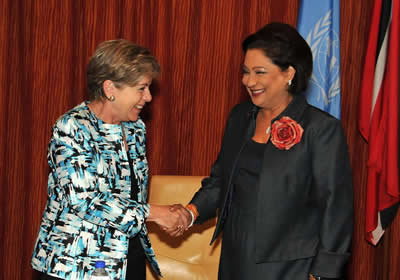ECLAC Calls For Strategic Regionalism in Latin America and the Caribbean
Work area(s)
Avenues for greater integration need to be pursued, said Alicia Bárcena, the Executive Secretary of ECLAC.

(14 September 2011) The Executive Secretary of ECLAC, Alicia Bárcena, called on the countries of the Caribbean to re-examine strategic regionalism as an approach to addressing the development challenges facing the region, during the Caribbean Development Round Table, on 13 September 2011 in Port of Spain.
The meeting organized by the Economic Commission for Latin America and the Caribbean (ECLAC) in collaboration with the Ministry of Finance of Trinidad and Tobago, examined new approaches and challenges to the sustainable development of small developing countries, including the Caribbean and Central America.
The opening session was in charge of the Executive Secretary of ECLAC, Alicia Bárcena, and the Prime Minister of Trinidad and Tobago, Kamla Persad-Bissessar, with the participation of the President of Guyana, Bharrat Jagdeo.
In her opening remarks, Mrs. Persad-Bissessar noted that the Caribbean Development Round Table offered an opportunity to rewrite the development ‘destinies' and to introduce a new path towards the long-held goals of the region, which include poverty alleviation, economic growth, social development, achievement of social equity, establishment of a more equitable international financial architecture, debt reduction, trade deficit reductions, and the diversification of trade and industry.
"Cohesion and cooperation are critical prerequisites for Latin America and the Caribbean to become a force to be reckoned with in the international sphere," Mrs. Persad-Bissessar noted.
The Prime Minister of Trinidad and Tobago challenged the participants of the Round Table to deliberate, debate and develop workable solutions and concrete directives to these barriers to development which may be applied ‘on the ground' in the Caribbean.
Alicia Bárcena delivered a presentation on "Time for equality: Closing gaps, opening trails", which proposed a strategy for economic growth that emphasizes investment, integration and innovation, and highlights the importance of building the State's capacity to redistribute resources and promote equity.
"Small States, collectively, need to advocate for a global financial architecture that minimizes the volatility of capital and institutes regulatory mechanisms to reduce financial contagion," Ms. Bárcena said. "Avenues for greater integration, especially through renewed efforts to implement regional agreements, need to be pursued in order to benefit from economies of scale."
Ms. Bárcena reaffirmed the commitment of ECLAC to work closely with the Caribbean Community (CARICOM), the Organization of Eastern Caribbean States (OECS) and other institutions in the Caribbean to address the challenges facing the region.
The President of Guyana, Bharrat Jagdeo, stated that the Caribbean must rethink development from its own perspective, and must determine what aspects of the global system best complement its development strategy.
"There is an urgent need to move away from outdated sunset industries to new industries that can drive growth and development, especially those with low carbon footprints," he said.
The Minister of Finance of Trinidad and Tobago, Winston Dookeran, spoke on the evolution of economic thought and development, stating that the region needs to build economic buffers to withstand price and commodity shocks and global recessions.
He called on countries to drill down to find endogenous economic growth strategies, and highlighted the need for the development of a new integration model that is appropriate to the current challenges facing the region.
The First Meeting of the Caribbean Development Round Table presented an opportunity to build bridges of cooperation between the Caribbean and Latin America, one of the regions which has been able to thrive economically, despite the recent global economic crisis.
The Executive Secretary of ECLAC held bi-lateral discussions with representatives of several Caribbean countries.
Ms. Bárcena met the Prime Minister of Antigua and Barbuda, the Prime Minister of Jamaica, the Prime Minister of Trinidad and Tobago, the Prime Minister of Grenada, who is concluding his term as Chair of the CDCC, and the President of Guyana, who will be assuming the position of Chair of the CDCC at its Twenty-fourth session in 2012.
Ms. Bárcena also met the newly appointed Secretary General of the Caribbean Community (CARICOM) and the Secretary General of the Association of Caribbean States (ACS). She also held discussions with the Minister of Foreign Affairs and Foreign Trade of Barbados, the First Vice Minister of Foreign Trade, Commerce and International Investment of Cuba, the Minister of Information, Telecommunications and Constituency Empowerment of Dominica, the Minister of Foreign Affairs, the Environment, Foreign Trade and Export Development of Grenada, the Minister of Foreign Affairs of Suriname.
The presentations and other meeting documents are available on the ECLAC Website: www.eclacpos.org
For more information, contact ECLAC Subregional Headquarters for the Caribbean:
Tel: (868) 224-8000; Fax: (868) 623-8485; E-mail: registryeclacpos.org;
Country(ies)
- Caribbean
- Trinidad and Tobago